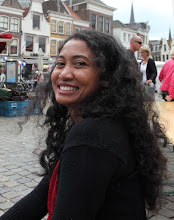A Children’s View of The Netherlands
LisaDidien
Saturday, November 29, 2014
0 Comments
- Erasmus Huis' bibliotheek verzameling -
Some of Dutch/English children books are interesting for me,
especially some classic ones and also which bring cultural topics.
The Netherlands – A Children’s View of... is one of children books which
gives a view about The Netherlands from children eyes by colourful kids’
illustrations made by 7-11 years old Dutch children to tell the reader about
their habits, feasts, religion, etc. Those
illustrations are combined with informations written by Marie Wijks, the
writer.
 |
| Book cover Source: Personal collection |
As a person from another country -not a Dutch- this book gave me basic knowledges about
Netherlands. It’s interesting as I was assuming myself as a child while reading
the illustrations and is also simply to be understood how every content is described
by good combination of those illlustrations and the sentences.
A thought of similarities with Indonesian culture popped-up as I found these information :
“ The guests bring flowers, en envelope with contents (money) or something for the home.” (page 17)
In Indonesia, nowadays the guests bring envelope with money when attending the reception of a marriage couple. In past, usually the guests bring something for the home, in example: tableware set, etc. Perhaps, nowadays the guests bring something but just few.
“ The guests bring flowers, en envelope with contents (money) or something for the home.” (page 17)
In Indonesia, nowadays the guests bring envelope with money when attending the reception of a marriage couple. In past, usually the guests bring something for the home, in example: tableware set, etc. Perhaps, nowadays the guests bring something but just few.
 |
| Source: Personal collection |
“On 30th April it is Queen’s Day. On that day
the Queen’s official birthday is celebrated. Flags are flown throughout the
country. Street games are organized.” (page 69)
Indonesian citizens in some regions also like to organize street games on The Independent Day every 17th August, though nowadays, those street games are not as many as in the past. What surprised me is that some games are similar: sack race (balap karung) walking on stilts(egrang), bite-the cake (in Indonesia, it’s not the cake, but is krupuk/kroepoek), climbing post(panjat pinang).
Hmm, what about the game marble spoon race (lari kelereng)? Any in
Netherlands?
 |
| Source: Personal collection |
Indonesian citizens in some regions also like to organize street games on The Independent Day every 17th August, though nowadays, those street games are not as many as in the past. What surprised me is that some games are similar: sack race (balap karung) walking on stilts(egrang), bite-the cake (in Indonesia, it’s not the cake, but is krupuk/kroepoek), climbing post(panjat pinang).
 |
| Balap Karung (Sack Race) Source: Internet |
 |
| Walking on Stilts (Egrang) Source: Internet |
 |
| Makan Krupuk (Bite-Kroepoek) Source: Internet |
 |
| Climbing Post (Panjat Pinang) Source: Internet |
 |
| Marble Spoon Race (Lari Kelereng) Source: Internet |
Then a question was arisen on my mind: are these similarities
result from Dutch colonialism years ago? Or are they international cultures?
Oh ja, other things that catch my interest are Curly Kale,
Doughnut Ball receipts and the folktales, especially the folktale of The
Volendam.
 |
| Source: Personal collection |
Well-done for this book! Happy reading and let explore the
world via books!
(...while hoping for the chance to travelling around the
world in the future, hihihihi....) :p












